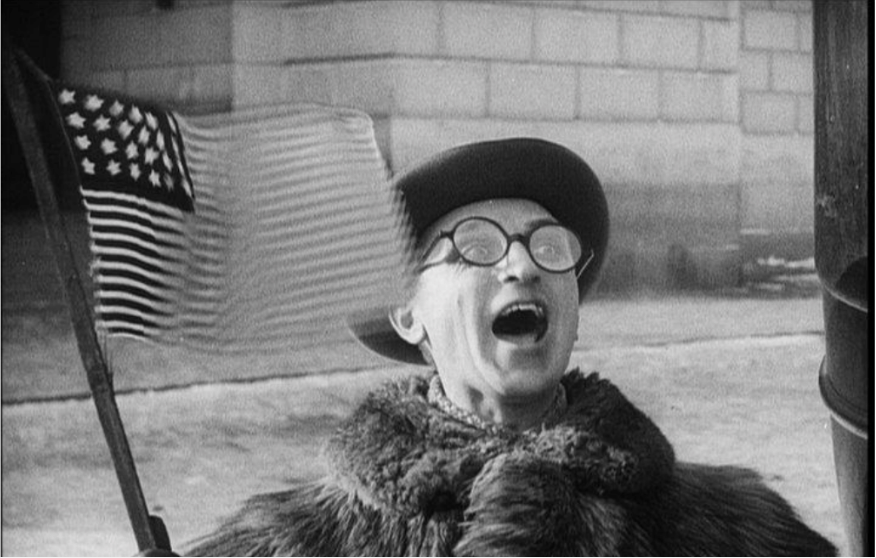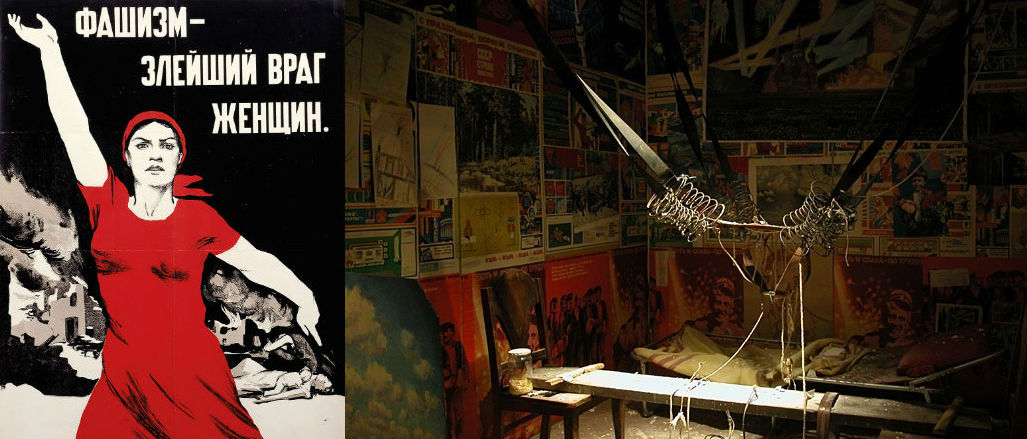The struggle for Palestinian rights is central to radical politics today. The fight for BDS (Boycott, Disinvestment, Sanctions)’ is the sharp end of this. The fury seen in the media and by most politicians as well as the huge sums spent by the Israeli state in countering BDS suggests a movement gaining in momentum
Read moreFighting the Enemy Without: Patriarchy in Bruce La Bruce’s The Misandrists
As sexism – pure, naked sexism and misogyny – rears its ugly ahead in the liberal democratic public sphere, it appears ever more appropriate to look back for insight to the feminist 1970s: a time oft-mythologized1 and (at times) faithfully portrayed as the era of very angry women. The 1970s are a complex moment in North American feminism’s past. The way we re-visit this so-called ‘foundational’ era of the Women’s Liberation Movement, it seems, will play a role in how we can imagine the horizons of feminism’s futures.
Read moreBringing Fuel to the Flames
When Anselm Jappe wrote Guy Debord in 1993, it was widely hailed as the first serious intellectual biography of the principal figure of the Situationist International (SI). Six years later, when the University of California Press published an English translation, Stewart Home1 declared it “both the most boring and by far and away the most stupid book to be written about a situationist to date.” On the other hand, Ken Knabb2 praises Jappe’s effort as “the only book on Debord in either French or English that can be unreservedly recommended.”
Read more“Wanna Define? So Say So!”: David Bryne’s Utopia
Two works sit before me. One, a non-descript jet-black Verso book, containing a controversial and often misunderstood thought experiment from the dialectical philosopher Frederic Jameson. The other is a record album by the great humanist songwriter David Byrne. Both are titled American Utopia. Both attempt to find countertendencies in the social whole in the 21st century, “late-late capitalism”, if you will, countertendencies that perhaps we can cognitively map, if not concretely perceive as utopian, as going beyond the semblance of time and place, a place where nothing ever happens, as “happening” implies going back to the dualism of fact and value that dialectical art and philosophy attempt to transcend. Byrne’s music, both literally and figuratively, provides a soundtrack to what Jameson called postmodernity – a concept about which one can hold agnosticism with regards to hard periodization, but still use to demarcate an aesthetic sensibility.
Read moreFirst Days of a Better Nation: Language between Dystopia and Utopia
There’s an inscription on a wall in Scotland’s parliament: Work as if you live in the early days of a better nation.
In his new novel Walkaway, the Canadian-British writer and activist Cory Doctorow imagines what it would mean to do exactly that in a world ravaged by capitalist inequality and climate change. Set in Toronto about a century in the future, this intricately crafted thriller uses deft linguistic innovation (more on that in a moment) and political extrapolation to envision the tension and conflict of an all-too-familiar dystopia existing side by side with a counter-utopia of freedom and possibility.
Read moreCombustible Fictions: The Literary Novel in the Anthropocene
Come with me into the hidden abode of literary production. Here, behind the comings of age amidst tragedy, the journeys of self-discovery traveled through existential crises, and the excavations of rotting family ties, lies a darker secret: the coal heart of the modern novel.
For Amitav Ghosh, himself the author of many novels including The Hungry Tide and Sea of Poppies, the idea that fossil fuels are at the heart of the modern novel is no metaphor, but rather historical fact. The assumptions of literary narration, he reminds us, are based on a second background assumption — “the orderly expectations of bourgeois life.”
Read moreRiots and Reality: Sorry to Bother You and Radical Irrealism
Image by Craig E. Ross.
Capitalism is an irrational system which refuses to see itself for what it is. Like an obnoxious trust fund kid slumming it at a dive bar, it cannot help but loudly declare how ingenious and deserving it is. Accepting its arguments for how things are and how they change is to accept the argument that there is some method underneath the layers of madness, that its opulence can somehow be separated from its exploitation, that it has something other than an ever-deepening inhumanity in its future. While our dreams are deemed irrational, capitalism’s degradations are justified as science.
To grasp the significance of Sorry to Bother You is, on some level, to grasp this truth about capitalism. Boots Riley has written and directed a film that is being celebrated by the far-left and mainstream critics alike. Those familiar with Riley’s musical and lyrical work with the Coup know that he is adept at combining his unabashed revolutionary politics with a skewed, cartoon-like worldview.
Read moreTaming a Rude Beast: Marx@200
Karl Marx, born in Trier, Germany and buried in London’s Highgate Cemetery, never visited the U.S. himself. Nearly a third of the 38 artists included in the Marx@200 Show in Pittsburgh, Pennsylvania are from outside the U.S. This provides powerful global context to a show that was born from a hunch that the 2008 global financial crisis had turned many artists toward Marx in a concentrated way. Curators Kathy Newman and Susanne Slavick – Carnegie Mellon University professors of literature and art, respectively – have brought together an impressive array of visual artworks themed around the figure of Marx, his writings, and capitalism’s depredations.
Read moreAfter Left Melancholia: A Winding Walk Though the Wreckage
The ruined Buzludzha.
In Nikolaus Geyrhalter’s Homo Sapiens (2016) the first and last shots of the film are of the Buzludzha monument in Bulgaria – constructed by the Communist state to commemorate the secret formation of its forerunner, Bulgarian Social Democratic Party, in 1891. After the collapse of the Eastern Bloc in 1989, it was abandoned. Today its vast chambers, statues and mosaics are crumbling.
Geyrhalter’s 90 minute film is composed entirely of stationary shots of human-made buildings that have been abandoned to the elements. Shopping centers in Fukushima, abandoned theatres in Detroit, nondescript hospitals, office buildings, shoreline amusements parks flooded by the tides.
Read moreAmericanism as 20th Century Communism
Lev Kuleshov’s The Extraordinary Adventures of Mr. West in the Land of the Bolsheviks (1924).
Artists, radicals and radical artists have always looked at the future, the horizon, and seen a telos of emancipation. From modern-day left-accelerationism to 90s anarcho-cybernetic to prog-rock’s discovery of the synthesizer, the future has been an emancipatory muse. Owen Hatherley’s Chaplin Machine engages what could be termed an early example of left-accelerationism: the Soviet avant-garde’s absolute fascination with America. Indeed, going with Hatherley’s beautifully written and sometimes cheeky account with this fascination that, to be frank, sometimes borders on mystification, one can even reverse the aphorism of Earl Browder, the old social-patriotic leader of the American Communist Party, “Communism is 20th century Americanism.” This is to say that to those in the early Soviet avant-garde, and indeed cultural producers in general, Americanism was 20th century communism.
Read moreInviting One’s Self Into the Future: Two Exhibitions
We are born. It should be a start, but it is in fact a non-start; for we almost immediately have our full agency and autonomy as human beings robbed from us. We spend a lifetime trying to grasp it back from beneath a growing pile of rubble.
Rubble is literally at the center of Ilya Kabakov’s Labyrinth (My Mother’s Album). A large installation among many included in the Tate Modern’s exhibition of Ilya and Emilia Kabakov’s work, it is a spiral of long hallways reminiscent of Soviet era communal apartment buildings.
Read moreOn Making Atwood Fiction Again
When I was a kid, I read a spoof in a nickelodeon about what it was like to watch a World War Two film with a German Shepherd. The punchline was that the dog always rooted for the wrong side. Viewing Hulu’s adaptation of Margaret Atwood’s 1985 sci-fi novel, The Handmaid’s Tale, I couldn’t help but to think of all the viewers who were sharing a sofa with friends, family, and lovers, who, openly or not, may view Gilead, the theocratic, dystopic, man-scape setting for the story, with a palate falling well short of the distaste intended by the filmmakers.
Read moreWords, War, Words: Bertolt Brecht's War Primer
The opening page of War Primer contains a short, four-line poem:
Like one who dreams the road ahead is steep
I know the way Fate has prescribed for us
That narrow way towards a precipice.
Just follow. I can find it in my sleep.
Beyond Heaven and Hell, This World is All We've Got: Blade Runner 2049 in Perspective
Denis Villeneuve’s Blade Runner 2049 is the much-anticipated sequel to the 1982 cult film directed by Ridley Scott. Like the original, 2049 is a visually stunning depiction of our potential dystopian future; one that if we read it in its historical context provides for us a detailed cognitive mapping of the continued decline of unfettered multinational capitalism. Also, like the original, the new film provides a surface level portrayal of the world that, if read in spatial terms, maps for us many of the contours of the rhizomatic networks of contemporary capital...
Read moreThe Time is Now: Art + Walter Benjamin
Walter Benjamin.
In early 1940, just before he attempted to escape to Spain from Vichy France, the Marxist theorist and art critic Walter Benjamin penned his Theses on the Concept of History. In twenty numbered paragraphs, Benjamin sketches his vision of the task of the materialist historian. In contrast to the historicist, whose method consists of merely adding “a mass of facts, in order to fill up a homogeneous and empty time,” the materialist historian employs a “constructive” method (XVII), piecing together the “tradition of the oppressed” (VIII) from the rubble of the catastrophic past into a “constellation” (XVII) that most accurately reflects the fragmented character of modern reality.
Read moreI Know Who Else Was Transgressive: Teen Vogue has better politics than Angela Nagle
In 1970, the famed “New Journalist” Tom Wolfe wrote an article, and later a book, lampooning a dinner party held by the progressive composer Leonard Bernstein for the Black Panther Party. Fresh off of decontextualizing the Merry Pranksters and Bay Area counterculture in Electric Kool Aid Acid Test, Wolfe, a cheeky, fresh-faced conservative, now was on a mission to show the silliness of what was not yet called “identity politics.” Poking fun at the very idea that a member of the BPP would enjoy hors-d’oeuvres; painting one dimensional figures of the Panthers and liberal intelligentsia in one swoop...
Read moreYour Job is to Tell Your Story
Caryolyn Mims Lawrence, Black Children Keep Your Spirits Free, 1972.
In 1968, at the height of the Civil Rights Movement, Martin Luther King was assassinated. In the immediate aftermath, a wave of riots broke across America. Known as the Holy Week Uprising, this was a largely spontaneous outpouring of rage and sorrow. Far from the Movement collapsing, it marched forward with renewed fury and determination. To paraphrase Stokely Carmichael, what the crowds had started saying was “Black Power”, and they were to keep on saying it. In the midst of this ferment, black artists and activists searched for new answers to the questions that cut across the African-American experience.
Read moreGet Out From Where?
Daniel Kaluuya (Chris Washington) in Jordan Peele's Get Out
Masterful cinema usually leaves little to accident. With the film world completely oversaturated by works that are intellectually lazy and yet somehow overwrought with production costs, this is easy to forget. Many would say that the age of the auteur is behind us. It’s overly glib, but also understandable.
Throw in a film that cuts against this, where everything is well-placed and intentionally so, and a film-going public hungry for something that hits the sweet-spot between smart and emotionally satisfying will not be able to stop talking about it. Enter, like an unexpected guest who has been hiding in your basement, Get Out.
Read moreWelcome to the Last Days
To rise to and consolidate power 20th century fascism invoked crude race and national origin myths. This is part of what led Breton to pose the problem of counter-mythology, a different set of stories; stories that would animate resistance – that would bring the weight of the past crashing down on the enemies of socialism and the working-class. As Walter Benjamin wrote, the hatred and sacrifice needed for revolution is nourished “on the picture of enslaved forebears.” For Breton this was bound together with Surrealism and its intersections of chance and plan, individual and collective psychology, dream and consciousness, individual and collective action. As our contemporary far-right movements have gained ground they have brought back the “belligerent gods.” And among the neo-fascist “alt-right” there is a return of esoteric occult fascism in the “Cult of Kek” and its Pepe the Frog fascinations. So, just as before, we need our own animating counter-mythologies – our own stories for living and fighting in this world – for ridding it of the “myths of Odin."
Read moreSoulèvements / Uprisings
Sigmar Polke, Against the Two Superpowers: For a Red Switzerland (1971)
We desperately need to explore a new genealogy for radical art – one that does not focus on obsessive materiality or abstracted gestures (isolated from social catastrophe); that does not avoid the brilliant moments of resistance that sustain us, but is not simply propaganda (although we need propaganda). Soulèvements – curated by philosopher and art historian Georges Didi-Huberman (winner of the 2015 Adorno Prize) – on display at the Jeu de Paume in Paris –provides an important contribution to exploring an alternative tradition for radical art.
Read more












